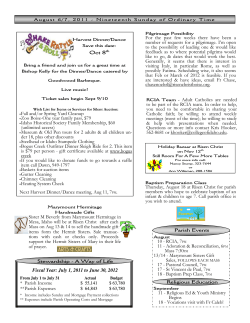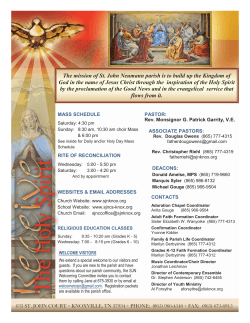
Registration How to register and live livesimplyaward.org.uk
In partnership with Registration How to register and launch the livesimply award livesimplyaward.org.uk “Each person’s joyful choices can be a visible example to others and give them courage to follow.” Introduction Welcome – and good luck! Thank you for wanting to help your parish or community to live simply. By joining with others to work towards a livesimply award, you can make a big difference – for your own community, and also for those most affected by climate change, poverty and injustice around the world. The simple commitments and actions your parish or community makes now will not only have a benefit in your own lives, they will also have an impact on many future generations of God’s children. The livesimply award celebrates the importance of building solidarity with people throughout the world Contents 3. Introduction 4. Simple steps for registration 5. How to achieve your award What is a livesimply award? The livesimply award is given to Catholic parishes and communities that have taken significant steps to respond to the Church’s call to live simply – so that others may simply live. It is awarded to parishes that show they have taken action to practise three Christian values, to live: • simply • in solidarity with people in poverty • sustainably with creation 6. Parish self-assessment 8. Your livesimply action plan 12. Registration form 14.100 livesimply ideas How does it work? There are four steps to register for an award: 1.If in a parish, get the support of your parish priest 2.Set up a livesimply group 3.Do a self-assessment to identify where to start 4.Make a plan of three significant actions and at least six supporting ones your community will take over a given time. These can include activities that are already taking place. Once you have registered you will receive a livesimply certificate to display and show others what you are working towards. When you can provide evidence you’ve successfully completed all your planned actions, you can apply for an award and will be visited by two livesimply assessors. If successful, you will be presented with your award plaque. 3 It is predicted that by 2025 3.4 billion people will live in waterscarce countries Simple steps for registration Step 1: Get the support of your priest It’s essential that the parish priest (or equivalent) is happy for you to go ahead. When asking for his support, emphasise how his interests and concerns will be helped by having people in the parish working towards a livesimply award. You could mention the potential of an award to enthuse young people, to enhance people’s spiritual development, or the likelihood of saving money on the church’s bills! You could also refer to the leadership of the Bishops of England and Wales (for example their statements The Call of Creation (2002) and The Common Good (1996) and the example set by Pope Benedict XVI, who has had the Vatican heated by solar panels since in 2008.) You know your priest best. Use the ideas in this and other livesimply materials to show him the award is something that deserves his support. Step 3: Do a self-assessment Step 2: Set up a ‘livesimply group’ The livesimply self-assessment questions (on page 6 of this pack) take you through a simple and, hopefully, enjoyable process. You may discover your parish or community is already doing some excellent things that could help you qualify for your award. You can start with a small group of perhaps 4–6 people. Ask any like-minded friends, but don’t just go for the obvious people. Also extend the invitation to others by putting up a poster, having a notice read out after mass, and inserting an announcement in the newsletter. When you first meet, find out what people’s interests are so that they have a chance to play to their strengths. Choose one person who will be responsible for communicating with livesimply assessors. The purpose of the group is to carry out the self-assessment using the materials supplied by livesimply and then to put together a plan for how your community is going to achieve its first award. Reassure people that the group will not be responsible for carrying out every activity in the plan – many activities will be things that appeal to different people and groups, including some that are already underway. Use our ideas sheets – with suggestions for reflection and worship, practical actions and reaching out into the community – and other livesimply resources to find inspiration for your plan. Step 4: Make a plan The self-assessment has helped you identify where you are already strong and where you could make some changes. The aim of your plan is to help you live simply, sustainably, and in solidarity with the poor, with at least one substantial activity for each principle – and two or more smaller ones. The whole plan should include: eflection and worship: helping the whole congregation link their faith with R livesimply principles through worship and teaching. Practical actions: putting simplicity, solidarity and sustainability into practice within the parish or community through initiatives such as Fairtrade, reducing energy use, or support for local families in need. Reaching out: extending the principles and activity of livesimply beyond the visible boundaries of your parish/community. Parishioners or community members are encouraged to live simply, sustainably and in solidarity with the poor in their homes, workplaces and neighbourhood, involving others in initiatives that transform personal and community lifestyles. This registration pack includes a template for your plan, with questions to help you be clear about your goals and how to tell if you’ve succeeded. Try to include things that suit the character and strengths of your community, and perhaps also something that feels more like a challenge. Consult your priest and others who could be involved, such as your parish pastoral council, justice and peace group, St Vincent de Paul or social committee and teachers from the parish schools. Work out a timeline over which you will put them into action, but don’t be too ambitious – things always take longer than you think! Perhaps aim to gain your award within one calendar or academic year. 4 How to achieve your award Plan into action Once you’ve agreed your plan and registered with livesimply it’s time to launch the award to the wider parish. A great way to do this is to hold a social event and/or liturgy. Resources to help you do this are available in the Reflection and Worship ideas sheet and on the website. You could also put regular bulletins in the newsletter, in notices after mass, and have a livesimply noticeboard to highlight progress towards the award. As more people become involved, you will be well on your way to achieving your award. Achieving your award When you’ve completed every action in your livesimply plan, you’re ready to apply for your award. To do this, fill in an award application form and submit it, together with evidence of your actions, such as photos, news cuttings, energy bills etc, to the livesimply award co-ordinator. “Individual actions may seem insignificant but together the small steps of many people can have an astonishing impact.” Two livesimply assessors will be assigned to consider whether you have met the required standards, visiting your parish to see for themselves what you have achieved. If successful, the livesimply award is yours! What next? It’s time to celebrate. Holding a special service or event will encourage even more people to join in living simply – and see the benefits it brings. Then, as the principles of living simply, sustainably, and in solidarity become embedded into the life of the community, there’ll be an annual opportunity to renew your award through a simple process of telling us how you have built on the previous year’s commitments. “Individual actions may seem insignificant but together the small steps of many people can have an astonishing impact. Each person’s joyful choices can be a visible example to others and give them courage to follow.” The Call of Creation, Catholic Bishops’ Conference of England and Wales, 2002. 5 Self-assessment One of the first steps to register to work towards a livesimply award is to carry out a self-assessment of the ways in which living simply is already part of parish or community life. You will have already called together a small group of people to work though the assessment. It aims to help your group reflect on your current activities under three categories: Reflection and Worship, Practical action in the parish/community, Reaching Out beyond the parish/community. Use the questions below to identify anything you already have going in each of the three areas: • Simply • Sustainably • In solidarity with the poor. At the same time as thinking about what’s already happening, you may start to get ideas for new things you could introduce. Gather these on a separate sheet. Self-assessment questions The following questions have been written for a parish group, but are also relevant for other Catholic communities. These questions are available in a form for you to complete at www.livesimplyaward.org.uk Reflection and worship We believe that through the lives God gave us we express his love. Through prayer, reflection and worship we hear God’s wishes for all that we do. 1. Does your parish offer opportunities to enjoy quiet reflection or appreciate the simple pleasures of God’s world; or to reflect on the effects of selfishness and greed? 2.How does your parish challenge pressures to own and consume more and more? What steps does it take to conserve natural resources and habitats, to use less and recycle more? Think about the use of parish buildings, energy, food, rubbish and transport? 3.When spending money, does your parish consider the environmental and social effects of its choices? Think about Fairtrade food and drink and sustainable products for building work and repairs, office and cleaning supplies. Practical There are many ways we can put our faith and love into action, starting in the daily life and practice of the parish. 1.How does your parish extend support and friendship to those in need – locally and overseas? 2.What steps does your parish take to conserve natural resources and habitats, to use less and recycle more? Think about the use of parish buildings, energy, food, rubbish and transport. When spending money, does your parish consider the environmental and social effects of its choices? Think about Fairtrade food and drink and sustainable products for building work and repairs, office and cleaning supplies. 3.How does the parish challenge the pressures and expectations of consumerist society? Does it strive to live simply so others may simply live? e.g. Pot luck supper or country walk instead of an expensive social event, or school uniform swap scheme. Think about ways in which the parish recycle, reuse, and reduce its consumption. Reaching out We are witnesses to God’s love in and for the world. We can take his love and justice beyond the parish into our local communities. 1.What does your parish do to encourage parishioners to take the principles of living simply into their daily lives at home, work and beyond? 2.Does the parish engage with the local council, MP, other decision-makers or the media – to influence public debate on issues of environmental and social justice? 3.How does your parish connect with other groups and individuals in the neighbourhood to share the Christian principles of living simply even more widely? Making a self-assessment fun One creative way to do the self-assessment is to make it visual and physical. Have three tables – Refection and Worship, Practical Action, and Reaching Out - or three wall spaces, with paper or post-it notes to write ideas or make little drawings on. Get each member of the group to spend time on each area, moving around several times, coming back to see what others have written and adding to each others’ ideas. TIP: If you’re finding it hard to think of things, take a look at the livesimply award ideas sheets. After you’ve exhausted your ideas, come back to have a look at the sheets as a whole. Are you surprised at what you see? From the ideas you’ve gathered list the activities you are already doing for each of the livesimply principles under each of three headings: spiritual, practical, reaching out. You’ve now completed your self-assessment. The next task will be to take the separate sheet where you’ve listed activities you don’t currently do and use this as a starting point to develop your plan for achieving a livesimply award. 6 7 Your livesimply action plan To qualify for a livesimply award, you need to make a plan containing at least nine (but could be more) actions. These should include at least one substantial action for each of the three principles – living simply, sustainably and in solidarity with poor people. A “substantial” action is one that involves either a significant change in practice or involves and affects a large number of people – not just your core livesimply group. Make sure that your plan includes actions that put livesimply into practice in each of the three ways: reflection and worship, practical and reaching out. You can include activities which are already taking place – but also some that are new, or that aim to reach new people. These forms are available for you to complete at www.livesimplyaward.org.uk 8 Actions to live simply Action What will you do? Why? What difference will it make? Who will benefit and be affected by it? Who will be involved in making it happen? Think beyond your core group – ask for help from people involved in different aspects of parish life, or none Activity 1 (substantial) Activity 2 Activity 3 More? 9 Which of the following is it: reflection and worship, practical, reaching out? It could be more than one What evidence will you provide to show you’ve succeeded? Eg photos, receipts, energy bills, news cuttings, liturgy sheets, reports When will you do this by? Be realistic Actions to live sustainably Action What will you do? Why? What difference will it make? Who will benefit and be affected by it? Who will be involved in making it happen? Think beyond your core group – ask for help from people involved in different aspects of parish life, or none Activity 1 (substantial) Activity 2 Activity 3 More? 10 Which of the following is it: reflection and worship, practical, reaching out? It could be more than one What evidence will you provide to show you’ve succeeded? Eg photos, receipts, energy bills, news cuttings, liturgy sheets, reports When will you do this by? Be realistic Actions to live in solidarity Action What will you do? Why? What difference will it make? Who will benefit and be affected by it? Who will be involved in making it happen? Think beyond your core group – ask for help from people involved in different aspects of parish life, or none Activity 1 (substantial) Activity 2 Activity 3 More? 11 Which of the following is it: reflection and worship, practical, reaching out? It could be more than one What evidence will you provide to show you’ve succeeded? Eg photos, receipts, energy bills, news cuttings, liturgy sheets, reports When will you do this by? Be realistic livesimply award registration form Please complete and return this form to the livesimply award co-ordinator. If all is in order, we will send you a livesimply certificate as a sign you are working towards a livesimply award. Name of parish/community (and diocese) Parish/community address and postcode Details of livesimply contact Title Forename and surname Address Postcode Email address Preferred telephone contact number We have the support of our parish priest (or equivalent) to register for the livesimply award (tick) We have set up a livesimply group (tick) We have carried out a parish self-assessment (please attach) (tick) We have made a livesimply action plan, including a timeline, for achieving the award (please attach) (tick) Signature of Parish Priest (or equivalent) I would like to receive updates from the livesimply co-ordinator by email (tick) I would like to receive monthly campaign updates from CAFOD by post (tick) I would like to receive monthly campaign updates from CAFOD by email (tick) 12 Please return this form with any accompanying information to: Advice and resources livesimply Award, EcoCongregation England and Wales, Groundwork Sheffield, The Innovation Centre, 217 Portobello, Sheffield S1 4DP Resources to help you plan and achieve your award include: livesimply award co-ordinator: David Hughes • Sheets of ideas for reflection and worship, practical actions and more Phone: 0114 263 6421 • Resources for worship, study and reflection (eg group meeting plan, ideas for mass, Catholic Social Teaching, Scripture, prayers, children’s liturgy) Email: coordinator@livesimplyaward.org.uk EcoCongregations and CAFOD will securely store the information you provide in accordance with the Data Protection Act 1998. We will not share your information with external organisations unless they work on our behalf. Should you wish to stop receiving communications at any point, please call 0114 263 6421. • Introducing the livesimply award • livesimply award application form These and many more can be downloaded from www.livesimplyaward.org.uk or ordered from the livesimply award co-ordinator, who is also on hand to offer help and advice. You can also use the website to share ideas and get advice from other Catholic parishes and communities who are working towards a livesimply award. 13 100 livesimply ideas There’s no shortage of ideas for your parish to consider when planning for its livesimply award. The livesimply ideas sheets have more information on all of the suggestions on this page. And there are online resources for those marked with a at: livesimplyaward.org.uk. You only need nine, but here’s our top 100: Reflection and worship 1. Silent walk 2. Loaves and fishes picnic 3. Creation walk, vigil or reflection 4. Seasonal liturgies 5. livesimply mass 6. Feast of St Francis, patron saint of the environment, October 4 7. UN World Environment Day, every June 5 8. Tree planting for Baptisms and first Holy Communions 9. Outdoor service 10. Christian Ecology Link’s Community of prayer for ideas by email 39. Walk to Church Sunday 40. Environmentally friendly cleaning products 41. Recycled paper and envelopes 42. Bird feeders, boxes or bat boxes 43. Wildlife garden 44. Becoming a Fairtrade parish 45. Ethical banking and insurance 46. Providing social housing on Church property 47. CAFOD World Gifts 48. Collecting rain water 11.Liturgy using Call of Creation - CAFOD photos from around the world Reaching out 12. Water reflections at Baptisms 49. Promote a parish ‘Unplugged Day’ - No TVs, phones or computers 13. CAFOD’s Lent and Harvest Fast Days 50. livesimply ideas Lenten or Advent calendar 51. Newsletter or noticeboard tips of the week Practical 14. Outdoor space for prayer and contemplation 15. “Reduce waste” rules for parish hall, events and parties 16. Composting kitchen and churchyard waste 17. Washable – not disposable - napkins, cloths, mugs and cutlery 18. Emails and texts - not paper 19. Printing double-sided 20. Toy or music library 21. Second-hand school uniform exchange 22. Church energy audit and monitoring 23. Draught-proofing and insulating church buildings 24. Switching to renewable energy 25. Energy-saving lightbulbs/switching off lights 26. Turning down thermostats 27. Meetings timetabled to minimise heating 28. Reducing use of floodlights 29. Turning off computers and photocopiers 30. Double glazing 31. Solar panels 32. Ground source heat pump 33. Reducing water wastage 34. Joining a campaign 35. Displaying local bus routes 36. Providing bike racks 37. Car-shares for meetings 38. Lift shares to church 14 52. Pledging ceremony 53. Parish walks open to all 54. Children’s gardening club 55. Jumble sales 56. Publicising local recycling facilities 57. Film evening: An Inconvenient Truth, or The Age of Stupid 58. Climate change quiz night 59. CAFOD’s Climate Change Game for youth groups 60. Climate Justice assembly for school 61. Links with local groups: Friends of the Earth, Wildlife Trust, RSPB 62. Litter-pick event 66. Taking action with CAFOD’s Climate Change campaign 67. Writing to local council leaders, MPs or MEPs 68. Writing to local newspapers about important local issues 69. Linking to communities in poor countries with CAFOD’s Connect2 70. Supporting local refugees, with the Jesuit Refugee Service 71. Making land available for people to grow food 72. Access point for local credit union 73. Car club 74. Supporting local furniture re-use organisation 75. Providing household items for rehoused homeless people 63. Community composting Taking livesimply home 64.Christmas livesimply workshop 76. Freecycle or Freegle 65. Green fair 77. Using charity shops 78. Reducing junk mail 79. Making-your-own... jam, clothes, treehouse, poem 80. Growing your own 81.Walking 82. Enjoying nature 83.Praying 84. Saying thanks 85. Buying ethical clothing 86. Carbon footprint check-up 87. Steps to save energy – and money – at home 88. Getting milk delivered 89. Walking, cycling, taking the bus, tram or train 90. Reducing driving speeds to use less fuel 91.Car-sharing 92. Saving water 93. Cooking leftovers 94. Having a weekly meat-free day 95. Composting 96. Providing temporary housing for homeless youngsters 97. Joining a campaign 98.Volunteering 99.Help Fareshare or local foodbanks distribute surplus food to people in need 100. Promote community living opportunities for young people Taking livesimply home: switch to a renewable energy provider 15 Contact livesimply award co-ordinator: David Hughes Phone: 0114 263 6421 Email: coordinator@livesimplyaward.org.uk Website: livesimplyaward.org.uk livesimply Award EcoCongregation England and Wales Groundwork Sheffield The Innovation Centre 217 Portobello Sheffield S1 4DP The livesimply award is being coordinated by Eco-Congregations on behalf of CAFOD, a member of the livesimply network. CAFOD Registered charity no. 285776. Photography: Simon Rawles, Richard Wainwright, Thomas Omondi, Joelle Hernandez, Debbie Cooper-Jones, Paul Jeffrey, Eleanor Church Design: Stadium Creative In partnership with livesimplyaward.org.uk Printed on 100% recycled paper
© Copyright 2024









